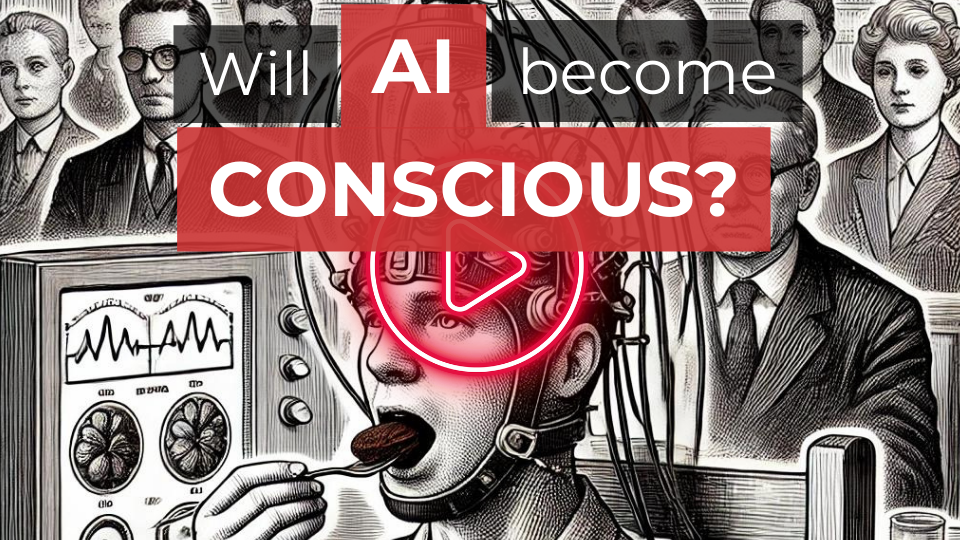References for this essay:
- https://www.youtube.com/watch?v=aLiic8Q-ECo
- https://global.oup.com/academic/product/the-border-between-seeing-and-thinking-9780197622223
- https://en.wikipedia.org/wiki/Hard_problem_of_consciousness
- https://www.youtube.com/watch?v=3tUTdgVhMBk
Imagine yourself as an eccentric Willy Wonka style character in a futuristic chocolate factory.
You’ve agreed to an experiment, and are now wearing a high-tech suit measuring everything – heart rate, brain waves, even the chemicals communicating between the tip of your tongue and your taste buds.
As you take the first bite of the most delicious chocolate known to man, screens around you light up with data showcasing every intricate detail – the neuronal patterns, the chemical reactions, everything happening in your body and brain.
But then you have a strange thought, an internal question.
Is all this data really capturing the true essence of your experience biting into that delicious bar of chocolatey goodness?
Despite all the incredible technology, there’s a strange feeling, a rich velvety sensation, a wave of pleasure connected to childhood memories washes over you in an instant.
An (unexplainable?) feeling of goodness.
There are many variations of this thought experiment, all designed to illustrate ‘The Hard Problem of Consciousness’, best articulated by Philosopher David Chalmers.
We are continually getting better at explaining all the intricate details and reactions you have to the chocolate (that is the easy problem of consciousness).
But really explaining how or why all those intricate reactions lead to that weird feeling?
Still a giant F’ing mystery.
That’s the hard problem of consciousness.
The Hard Problem of Consciousness
This so-called hard problem of consciousness has recently gathered some serious attention, for the primary reason – could Artificial Intelligence become conscious?
As Cognitive Neuroscience Anil Seth recently shared:
“We are already living in a world where we will be unable to resist feeling as if AI systems are conscious; this is already happening.”
and
“Is GPT-4 conscious? If not, could GPT-6 be conscious? We need to have something to say about that question, even if it’s not with 100% confidence.”
I recently shared some thoughts by Philosophers and Neuroscientists who share the belief that we at least need to consider the possibility that Artificial Intelligence will become conscious, even if not identically to human consciousness.
For example David Chalmers and Sam Harris.
Ned Block and Cognition won’t work for consciousness
Some interesting studies show that babies can ‘perceive’ colour before eveloping a ‘conceptual understanding of colour.’
A four month old girl, for example, can perceive a red ball as different from a blue ball. The colours might even invoke different feelings for her. But she doesn’t yet have the ‘cognitive capacity’ to communicate what colours are, or communicate which is her favourite.
In a recent ‘Closer to Truth’ conversation, Ned Block (another philosopher who works alongside Chalmers) uses this (and many other examples) to strengthen his case that:
Consciousness might be more closely related to perception than cognition – and that it’s possible to have conscious experiences without thinking about them.
Which leads him to the conclusion:
While AI might develop cognitive capacities, it will lack perception, and likely won’t develop ‘consciousness’ in the way biological systems do.
If I’m understanding this correctly – unlike the four month girl who is basically delivered into the world equipped with perceptive abilities; the ability to perceive colour before developing the cognitive abilities to understand and talk about colour, AI will have the cognitive capacity to talk about colour, but not the ability to perceive colour.
Block believes consciousness and perception may be closely related.
Which at least feels intuitively correct.
His recent book (the border between seeing and thinking) explores:
- Seeing versus thinking
- Perception versus cognition
- Phenomenal versus access consciousness
Which are closely related, and related to the hard versus easy problems of consciousness.
How and why does the weird and wonderful ‘experience’ of tasting chocolate magically arise?
